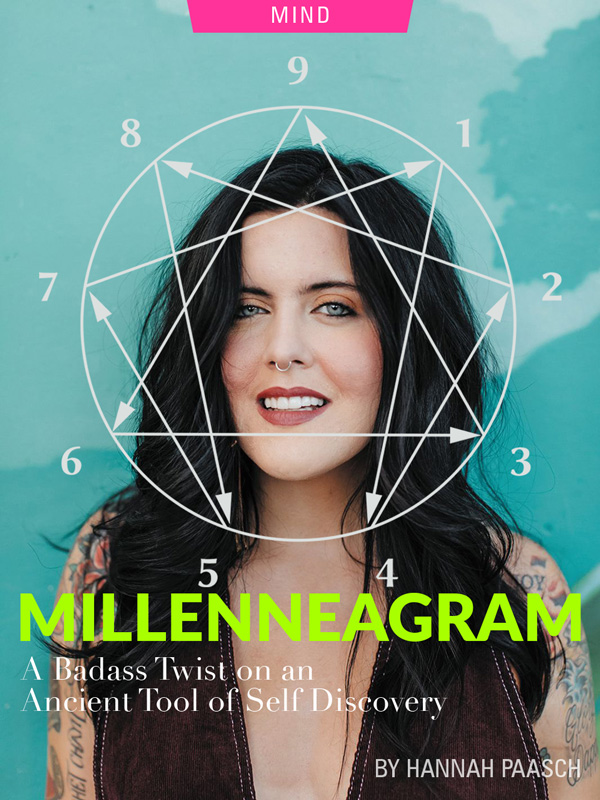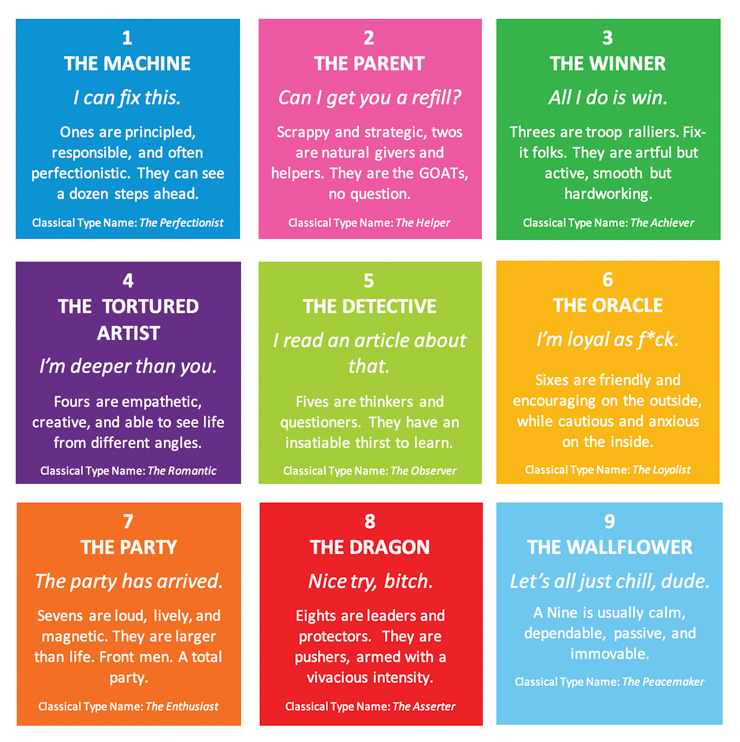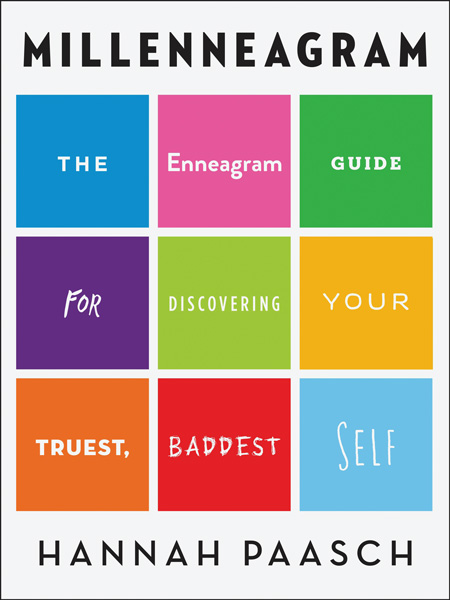
A revamped spin on the Enneagram that helps us be our truest, enough-as-is, badass selves
—
Where does your knowing come from?
Is it your gut that alerts you to information that others are oblivious to? Is it the wealth of information you’ve amassed through reading (and let’s be real here, it’s 2019, binge-Googling)? Or are you led by your emotional center, spurred on to both love and chaos by the tides of your feels? While clearly the lines blur because we’re human — I’d like you to consider the source. Most of us have a center from which we live and work, plan and play, dream and dramatize.
We are quick to misunderstand those of us who ascribe to different knowledge centers.
The gut folks are easily misread as paranoid or hasty. We like to imagine the information-gatherers as cold and remote. Feelings folks are deemed messy and flighty. I’d like to submit, for your consideration, that just maybe — we’re ALL right.
I can feel the side-eyes on the back of my neck now, so let me explain.
Let’s just try this on for size. What if there were three centers from which we as humans, know things? What if we could validate our individual journeys and pursuits because others have strengths where we have weaknesses, and vice versa? The Gut Center, the Mind Center and the Heart Center. And the BIG ‘what if’ — what if…we needed each other?
The intuitive folks can sniff out dangers and possibilities the rest of us only fantasize about, turning our maybes into realities. The thinkers provide us with the stats; the cold hard facts that the rest of us are often too impatient to sniff out. The feelers make us human, reminding us of abstract and difficult things like love and connection — and how desperately we need them to make our lives worth living.
The Enneagram is an ancient tool, a personality typing system. The nine-pointed Enneagram symbol represents nine distinct strategies for relating to the self, others and the world. I’ve given it a new twist and an overhaul — a revamped spin; new names and new catch phrases to help us be our truest, enough-as-is, bad-ass selves.
See below:
- #1 The Machine: “I’m an Enneagram 1 and I Can Fix This!”
- #2 The Parent: “I’m an Enneagram 2 and Can I Get You a Refill?”
- #3 The Winner: “I’m an Enneagram 3 and All I Do Is Win.”
- #4 The Tortured Artist: “I’m an Enneagram 4 and I’m Deeper Than You.”
- #5 The Detective: “I’m an Enneagram 5 and I Read an Article About That.”
- #6 The Oracle: “I’m an Enneagram 6 and I’m Loyal as Fuck.”
- #7 The Party: “I’m an Enneagram 7 so This Might Be Vodka In My Mug.”
- #8 The Dragon: “I’m an Enneagram 8 so Nice Try, Bitch.”
- #9 The Wallflower: “I’m an Enneagram 9 so Let’s Just All Chill Out, Dude.”
What’s Your MILLENNEAGRAM type?
The Enneagram personality typology explores our recurring themes and coping mechanisms, providing us with a tool to reflect upon our innermost selves. Each personality type is given a number — there are nine types in total. MILLENNEAGRAMreinvigorates the Enneagram by putting a contemporary spin on the classic nine types:

[The following is excerpted from Millenneagram by Hannah Paasch, copyright 2019. Reprinted with permission from HarperOne, an imprint of HarperCollinsPublishers.]
An Excerpt from MILLENNEAGRAM
Self-help books abound. I swear, every day I see some new fix-it guide to getting your life back on track. As a connoisseur of inspiration — I love a good meaty Chicken Soup for the Soul, honey — I can tell you: most of them are gonna say the same old shit and just repackage it. Are there a few useful tidbits? Probably. Does it apply to you personally in any way? Probably not.
Enter the Enneagram.
Plainly put, the Enneagram is a personality typology that has a sneaky way of reflecting our innermost selves.
Each personality type is given a number— there are nine types in total— but you should view that number as a starting point, not as a label to pigeonhole you.
Maybe it would help to start at the beginning. The Enneagram symbol itself is ancient, but the Enneagram model of human personalities as we understand it today is from a guy named Oscar Ichazo, who was inspired by the expansive ideology of philosopher and teacher George Gurdjieff. Ichazo, also a philosopher, sorted nine distinct personality types out of Gurdjieff ’s spiritual system of the seven deadly sins, positing that we all have go-to passions, or coping mechanisms, that create recurring themes throughout our lives. For example, some people just can’t shake that they’re missing something everyone else has, and they’re pretty fuckin’ envious of those around them. (Hello, baby Fours, I see you.)
In the 1970s, famed psychiatrist Claudio Naranjo synthesized the Enneagram with modern psychology and called each of the types an “ego fixation.” That’s just a fancy term that means we all have systems of coping mechanisms that help us survive what comes our way in life, as well as assign value to ourselves.
Today, the Enneagram is a system for understanding the self that marries what we know about the mind and what we sense about the spiritual realm.
Just like how humans are half animal and half spirit, half concrete and half abstract, half learned and half unique, with one foot planted on the earth and the other leaping toward the stars — the Enneagram seeks to make sense of the wild, painful, glorious lives we lead.
I’ve been an Enneagram nerd since I first discovered it ten years ago, in my former life as a maudlin youth at a conservative Bible college. I still remember where I was when I discovered my number, because I got fucking pissed off. I was sitting in a Starbucks in downtown Chicago, reading an Enneagram book and trying to peg all my bland-ass seminary friends. I started in on the type Four chapter, and my first thought reading the description was Damn, these folks suck. Second thought? Fuck. That’s me, isn’tit? I slammed the book down on the table and broke into a really intense pensive window-staring sesh. How could Iof all people be some self-centered individualist? ME, dramatic? ME, tortured? AS IF.
When you read the words that call your bluff, everything changes. After I’d come to terms with being a Four and read every book I could get my hot little hands on about it, I was able to laugh at my ego fixations (that shit hates being laughed at, lemme tell you what) and chart a path forward, smoothing out brain ruts and old emotional wounds as I went. I was able to figure out why the fuck I was so annoyed with my closest friends, which made me feel less crazy, while learning a deeper, driving sense of compassion that defined my interactions with them going forward.
The Enneagram helped me figure my shit out. I’m gonna show you how it can help you too.
You may also enjoy reading Recipes for Self Love: Caring for Your Inner (and Outer) Feminist, by Alison Rachel
